Urban congregation program gathered six pastors and
20 lay people from cross-cultural mix of churches
Six pastors and about 20 lay people from a cross-cultural mix of six downtown Spokane congregations are extending bridges they have built with each other in an urban ministry class to their congregations and the community.
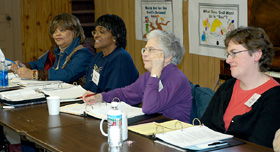 |
| Women share in the program. |
After “jovial pleasantries” of early relationship building in class settings, they have established trust and now meet on their own for fellowship and prayer.
They are sharing what they learn with their church councils and adult classes, through newsletters and sermons. Realizing that those lack the power of their personal connections, they have planned several ecumenical worship services to draw in their members and the community.
Cooperation builds influence
Participants hope their relationship will continue after classes end in May, so they can address the poverty, isolation, homelessness and other issues people around them face.
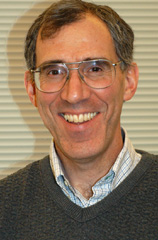 |
| Tim Dolan |
“The religious experience in the Northwest can be isolating, as churches differentiate themselves from other churches. Churches that cooperate can have more influence on the community,” Tim observed.
Dale hopes churches will build relationships that create “surprising ahas,” awareness that they have common ministry despite differences in theology, gender and race.
Interchanges diversify networks
Participants are a mix of black and white, women and men, clergy and laity.
Interchanges help them diversify their networks racially, socially and economically, coming together around their commitment to God and to follow Jesus to make a difference in the quality of life for individuals and families, enriching their neighborhoods and the city, said Peter.
Churches involved are Bethel African Methodist Episcopal (AME), Westminster Congregational United Church of Christ, Holy Temple Church of God in Christ, Central Lutheran, Calvary Baptist and First Presbyterian.
The program is one of several since a shooting and suicide in 1992 at Calvary Baptist, while students and faculty from Whitworth were visiting.
Whitworth started an educational program for African-American pastors and has a partnership with Calvary and other African-American churches. The Rev. C. W. (Chet) Andrews, pastor at Calvary, also works as a chaplain at Whitworth.
The urban program builds on trust Whitworth has engendered in the black community.
It is designed to give pastors and lay people skills in Christian leadership styles, managing churches, changing urban environments today, supporting networks to enhance collaborative opportunities, and creating cross-cultural ties among urban churches.
Participants have walked in their neighborhoods to see what the homes, buildings and environment say about the community and issues for effective ministry.
Group plans Pentecost service
Church teams each develop a project—a retreat, a planning session, lay training, a support group, strategic partnerships or a fund-raising plan.
One project was a joint Good Friday service at Central Lutheran Church. Another is a Pentecost celebration at 4 p.m., Sunday, May 15, at Westminster Congregational UCC.
Class members will also join celebrations planned for Chet’s 30 years in ministry at Calvary Baptist April 6 to 10. Central Lutheran will host the closing worship at 3:30 p.m., Sunday, April 10, because they have more space for it than Calvary.
They also plan to ask their first instructor to come back and preach for a revival of the hearts, minds and spirits of members of the six churches.
They hope to extend beyond once-a-year contact at Martin Luther King, Jr., celebrations.
Leadership development is goal
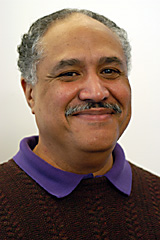 |
| Peter Dual |
He spent more than 20 years in the California State University system before he moved to Spokane four years ago.
Tim, who has been with the center since it was founded in October 1998, has been pastor of two Presbyterian churches. He has completed doctoral studies in leadership at Gonzaga.
“Urban ministry has unique dynamics, so this program helps us focus on leadership and church management in the urban context,” said Tim, who participates in Colbert Presbyterian Church.
He applies approaches used in the center’s certificate in leadership and church management programs.
“We seek to help pastors and lay people deal with relationship, leadership and organizational issues,” he said.
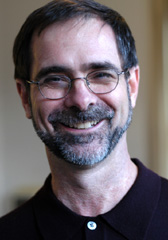 |
| Dale Soden |
“My interest in developing this as a pilot project is to provide a resource to help six churches know each other as neighbors across racial and economic differences,” he said.
Eight sessions included
The eight-session program has been covering various issues:
• In the first two sessions, James Noel, associate professor in African-American Christianity at San Francisco Theological Seminary in San Anselmo, discussed biblical visions for empowering lay leadership for urban ministry.
• In December, Ron Pyle, associate professor of communication studies at Whitworth, discussed communication and conflict management in churches.
• In January, Scott Rodin, a consultant in financial management from Seattle, focused on church finances, budgets, stewardship, fund raising and endowments.
• In February, Carl Green, assistant superintendent of the Northwest District Church of the Nazarene, spoke on administrative issues related to roles, responsibilities and authority of volunteers, staff and church boards.
• Dale led the March session on planning for the future—connecting theology with goals and vision.
• “Maintaining a Balance in Ministry” is the theme for April 9, led by Tom Soeldner, congregational consultant, instructor in family systems and pastor of Salem Lutheran Church in Spokane. He will review ways people in ministry can stay healthy and avoid burnout from stress.
• In session eight, “Growing Your Congregation and Sharing Faith,” on May 14, Tim will present principles of church growth.
Implementing what they learn
The program mixes formal classroom presentations and informal learning clusters, where participants discuss how to implement what they learn.
“We are following God’s lead,” said Peter, “seeking to develop rapport across racial lines as people recognize their common hopes, successes and problems.”
Pastors find that lay involvement gives them a support base to implement ideas, Dale said.
“The team approach also assures accountability,” Tim said.
It breaks through hierarchical decision-making that often leaves lay people waiting for clergy to make decisions, which can isolate pastors, said Dale, adding, “We seek to reinforce benefits of collaboration, cooperation and connectedness.”
Tim said participants deal with issues all churches face based on the nature of ministry, the complexity of leadership and the complexity of organizations.
“Change and conflict are part of church life. People often resist change, wanting growth without change, but there is no growth without change or conflict,” he said. “Communication helps deal with change and conflict.”
He believes there is better learning in the ecumenical setting, because a diverse setting allows for safer, more open discussion of issues that may affect pastors’ jobs.
God’s word connects people
Peter said the group focuses on how God’s word connects across faith lines. As African Americans share their suffering, they discover that others suffer, too, he said, so everyone in the room can relate.
“We all share in suffering as we live through different times of U.S. history,” he said.
Tim said that’s why relationships through learning in community are key.
“We encourage participants to put what they learn into practice in the real world of their churches, then to come back, learn more and reflect in a cycle of learning, reflecting and doing,” he said. “We hope the relationships become a basis for ongoing community.”
Partnerships empower
Peter said that there is power in partnerships, “in diversifying our networks and resource base, building collaboration in the city among churches—black, white, Asian and Hispanic—learning to understand each other so we can have impact on people and families in neighborhoods.”
Rather than developing competing programs, he believes they can work together to honor God, follow Christ and serve humanity.
For information, call 777-4676.
Classes inspire informal gatherings, worship, common action
Often feeling “overbooked” by study programs, the Rev. Andy CastroLang of Westminster Congregational United Church of Christ relishes informal gatherings related to the Urban Congregation Program at Whitworth, opportunities to pray and eat together, to see each others’ churches and to extend talking “shop” beyond clergy to laity, who “have their own take on things.”
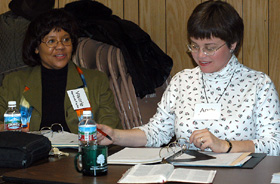 |
| Elisha Mitchell and Andy CastroLang |
“We are inching to honesty and openness,” Andy said, giving an example: “One pastor admitted, ‘I have trouble delegating.’ A lay member chimed right in: ‘That’s right.’”
Across the mix of race, theology, gender and economic levels, participants are moving beyond those “first jovial pleasantries” to establish understanding and trust, an authentic relationship built on scriptures and prayer, Andy said.
As a woman pastor of a declining white mainline church, she found that the Rev. Ezra Kinlow of Holy Temple Church of God in Christ deals with similar financial issues in a predominantly African-American congregation that recently moved to a larger, but still old and hard-to-maintain building.
“We find commonalties. We learn we need to listen,” Andy said.
“Urban ministry can be isolated and isolating. Working with people who are hard hit and the least powerful can feel overwhelming. Now I have compatriots in six churches, so I don’t throw my hands up,” she continued.
“Each of our churches works in different ways with the city’s people. In some cases, we may be able to work together. In other cases, we may just give each other support.
“I no longer think I’m alone in a church by the freeway, visiting the sick, mentally ill and homeless around the church. I know others in other churches are doing the same,” she said.
“Now we want our congregations to experience what we have experienced, to be enriched as we are enriched by each other,” said Andy, who believes that program organizers hope that “we will be a stronger force for good in the city if we work together, support each other, drop suspicions and stop competing.
“If we feel disempowered, we now see the pastor and congregation down the street are our brothers and sisters,” said Andy.
“I hope we will not stop seeing each other after the class ends,” the Rev. C. W. (Chet) Andrews of Calvary Baptist said to a chorus of agreement by others.
He wishes every pastor could go through the training that helps churches act 1) to let the outcast and downtrodden know someone cares, 2) to deal with church budgets, understanding the income expected and where it is spent.
“It has unified our churches. We may worship in different ways, but we worship the same God, who wants us to come to where there are no hills and valleys, no color or gender, because we are one in the Spirit and one in the Lord,” Chet said. “We all worship the one true God through different perspectives. We joke about the frozen chosen Presbyterians, the gospel singing Calvary members and the higher tempo peppier singers at Holy Temple.
“We will continue in fellowship to keep us knit together for urban ministry beyond worship,” he said.
Interracial, intercultural contact and commitment is nothing new for Chet: “I am radical in my conviction and prayer that we all should put our hands, feet and legs together. We are all created equal. Those who have should share with those who do not have,” he said.
In 30 years, he has seen many changes, but knows more are needed, because racism continues.
“I hope and pray we will move past Sunday mornings being the most segregated hour,” he said.
His long ministry has been the gift of a congregation loving and caring for their leadership. After 20 years with AT&T, which brought him to Spokane, he gave up retirement five years short of the required tenure. Calvary Baptist asked him to stay when AT&T wanted to transfer him.
While God and the Gospel remain constant, he finds that communication about them must change to reach people from different subcultures, views, technological skills and other influences today.
“To teach another, you have to learn,” Chet said.
He and four lay participants from his congregation, Jo and Ron Frazier Joyner, Michael Kay and Patricia Maddox are sharing what they learn at Wednesday evening gatherings.
Jo, who traveled throughout the world as a military spouse and has connected with people of other races, cultures and churches, is pleased that churches are opening their doors and building relationships to break down the “prejudice hour” on Sunday mornings.
“When doors swing open to the other churches, people do not look like me. It’s like a salad bowl, a rainbow, a glimpse of what it will be in heaven where there are no racial or denominational divisions, but we are all God’s children, serving the same God.
“Walking together, the journey does not seem so long and tedious,” said Jo.
For Dwight Palmer, who has attended Central Lutheran Church for 12 years, the urban ministry seminars provide a review of planning processes. He, too, has had intercultural and interracial contacts previously as an administrator at Washington State University’s College of Agriculture in Pullman, where he attended Trinity Lutheran Church for 20 years.
The urban ministry study coincides with the congregation’s pastoral search process, which includes a mission assessment, cottage meetings and contacts with 200 members to elicit their hopes and dreams.
Originally a Scandinavian-heritage church, Central Lutheran is now a mix of nationalities, Dwight said.
The Rev. Gail Duba, Central Lutheran’s urban minister brings the congregation a varied background from teaching biology, living in Saudi Arabia, working in forestry and serving as a Christian education director before she began long-distance seminary studies at Pacific Lutheran Seminary in Berkeley.
She previously tried to connect with neighboring churches through the Downtown Urban Ministry, but found efforts less intentional than the eight months of study, trust-building, relationship, fellowship and common worship. She hopes their relationships will grow into cooperative community service.
For members of Bethel African Methodist Episcopal Church, the class has coincided with remodeling their sanctuary and plans for building Emmanuel Center.
“What we have learned in class will help us manage the ministries of Emmanuel Center,” said the Rev. Lonnie Mitchell, pastor.
“I see what other churches are doing, and realize we could combine our efforts to leverage participation in the community, learning from each other and sharing our resources to fight poverty,” he said.
For information, call 777-4676.
By Mary Stamp, The Fig Tree - Copyright - © April 2005




